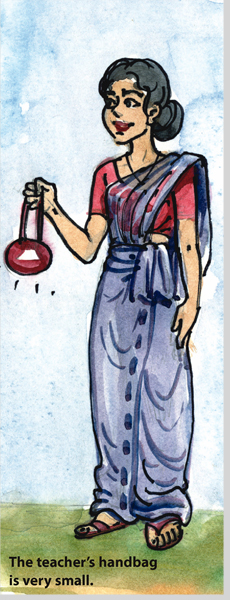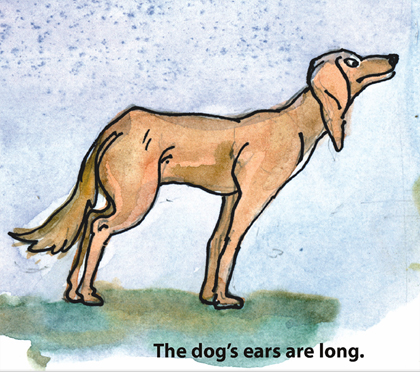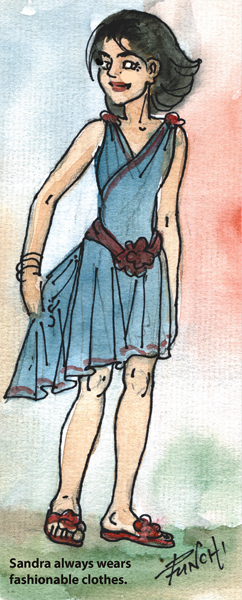|

by R. S. Karunaratne
More on possessives with 's and s'
Possessive nouns with 's take the place of 'the.'

The car that belongs to Sam is under repairs.
= Sam's car is under repairs.
The umbrella that belongs to our classteacher is multi-coloured.
= Our classteacher's umbrella is multi-coloured.
The house that belongs to Peter will be auctioned tomorrow.
= Peter's house will be auctioned tomorrow.
The cow that belongs to Paul is brown.
= Paul's cow is brown.
The mobile phone that belongs to Laura is expensive.
= Laura's mobile phone is expensive.
Sometimes, a possessive noun can have its own article.
The car that belongs to the director met with an accident.
= The director's car met with an accident.
The tie worn by the youth is blue.
= The youth's tie is blue.
The shoes worn by the boy are new.
= The boy's shoes are new.
The handbag that belongs to the teacher is very small.
= The teacher's handbag is very small.
The pen that belongs to the girl is missing.
= The girl's pen is missing.
We use possessive 's or s' to talk about possession, relationship or
experience.
Possession
Amanda's dictionary has a compact disc.
The baker's products have a ready market.
The doctor's dispensary is nearby.

Jaya's computer is new.
Mary's bunch of keys is missing.
Boys' shirts are sold here.
Relationship
Lesley's son is living in Australia.
The principal's daughter is in my class.
Lloyd's mother is flying to Cairo.
Father's sister visits us regularly.
The parents' meeting will be held tomorrow.
Experience
Mary's English lessons are interesting.
The judge listened to the lawyer's arguments.
The judge's verdict came as a surprise.
The chief guest's talk was boring.
Teachers' restroom is on the first floor.
The teacher's explanation was satisfactory.
We use 's or s' after the names of people or animals.
This is my father's dictionary.
These are students' exercise books.
He is wearing his brother's T-shirt.
John's house is built on a hill.
Susan's parents are leaving for Malaysia.
The dog's ears are long.
The horse's speed is marvellous.
We heard the lion's roar.
The giraffe's neck is long.
With some common time words we use 's to say how long something
takes.
A minute's silence prevailed.
A second's thought changed my plans.
An hour's stay on the beach will be invigorating.
He went on a week's holiday.
After three minutes' silence we started the proceedings.
After a year's training in the United States she returned to the
island.
We can use noun + 's without another noun.
A: Whose car is this?
B: Rosy's.
Her eyes are blue, but her children's are brown.
A: Whose laptop is this?
B: Rexy's.
Match words and meanings
Here's an exciting way to enrich your vocabulary. Match the words in
Column 'A' with their meanings in Column 'B' and check your answers with
the key. The first has been done for you.
Column A
U 1. diadem
... 2. diagnosis
... 3. diagram
... 4. dialogue
... 5. diametrically
... 6. diamond
... 7. diamond jubilee
... 8. diamond wedding
... 9. diarist
... 10. diaspora
... 11. diatribe
... 12. dicey
... 13. dichotomy
... 14. dictate
... 15. dictator
... 16. dictatorial
... 17. diction
... 18. didactic
... 19. diddle
... 20. die
... 21. dietary
... 22. dieter
... 23. different
... 24. difficult
... 25. diffident
Column B
A. a judgment about what a particular illness is
B. conversation written for a book, play or film
C. the day exactly 60 years after a marriage
D. an angry speech or piece of writing
E. to give orders
F. a leader who has complete power but not elected by the people
G. intended to teach
H. relating to your diet
I. not the same
J. not easy
K. shy and not confident of your abilities
L. to get money from someone dishonestly
M. someone who is trying to lose weight by dieting
N. a difference between two completely opposite ideas
O. someone who is known for writing a diary
P. the day exactly 60 years after an important occasion
Q. an extremely hard valuable stone
R. completely
S. slightly dangerous or uncertain
T. liking to give orders
U. a small crown
V. to stop living
W. the manner in which words are pronounced
X. the spreading of people from one country to other countries
Y. a simple plan which represents a machine or system
Key:
2. A 3. Y 4. B 5. R 6. Q 7. P 8. C 9. O 10. X 11. D 12. S 13. N 14. E
15. F 16. T 17. W 18. G 19. L 20. V 21. H 22. M 23. I 24. J 25. K
Starters:
Identifying adjectives and adverbs
Beginners sometimes find it difficult to identify adjectives and
adverbs. An adjective describes a noun and an adverb describes a verb.
Adjectives
The singer has a mellifluous voice.
Sandra always wears fashionable clothes.
A hungry man is an angry man.

The tall boy won the high-jump competition.
A small girl welcomed the chief guest.
Adverbs
The old man walked slowly.
Susila dresses expensively.
The beggar looked at the food hungrily.
He stared coldly at me.
The police officer looked carefully at the suspect.
We form adverbs from adjectives by adding 'ly.'
Parents love their children truly.
Max passed the Law College Entrance Examination easily.
The passenger looked at the bus conductor angrily.
The children swam across the river happily.
Father spent heavily for his medical expenses.
We slept comfortably after the day's work.
The boy answered my questions sensibly.
I bought a watch that works automatically.
He proved his point scientifically.
An adjective can come after a linking verb.
We could not walk further as we were hungry.
The children seemed happy with their gifts.
Everybody agreed that she is beautiful.
The food tasted awful.
The driver appeared to be drunk.
The 'ly' is the normal adverb ending. However, a few adjectives also
end in 'ly.'
Hema was very friendly.
We had a lively party.
Did you have a lovely time?
We should help elderly people.
It is likely to rain today.
Don't be silly.
An ugly old woman was waiting at the door.
Certain words can be used as adjectives and adverbs.
We did some hard work. (Adjective)
She works hard. (Adverb)
Did you come on the fast train? (Adjective)
The car sped fast. (Adverb)
The boy fell and got a deep cut on his chin. (Adjective)
If you think deep into the problem, you will find a solution.
(Adverb)
The early bird catches the worm. (Adjective)
We came early to catch the morning train. (Adverb)
I have no high hopes in life. (Adjective)
Don't jump too high! (Adverb)
Late comers were not admitted to the auditorium. (Adjective)
He walked till late into the night. (Adverb)
It is a long way from here to Colombo. (Adjective)
We waited long to meet the minister. (Adverb)
This is one of my near relatives. (Adjective)
He came near me and asked for a donation. (Adverb)
You are the right person to do this job. (Adjective)
Everything will go right if you follow the instructions. (Adverb)
You're questioning the wrong suspect. (Adjective)
Everything went wrong. (Adverb)
Some pairs of adverbs have different meanings.
She tried hard but failed.
I've got hardly any money. (very little)
The police station is quite near.
She nearly fell off the chair. (almost)
Sam arrived late, as usual.
I've been busy lately. (in the last few days)
'Good' is an adjective. 'Well' is its adverb. Similarly, 'bad' is an
adjective, 'badly' is an adverb.
Mohan is a good violinist. (Adjective)
He plays the violin well. (Adverb)
I had a bad night. (Adjective)
I slept badly last night. (Adverb)
Quiz on idiomsAn idiom is a special kind of phrase. It is a group of
words which have a different meaning when used together from the one it
would have if the meaning of each word were taken individually. Tick the
meaning of the following idioms in bold and check your answers with the
key.
1. If one thing is a far cry from another ...
(a) the two things are very different
(b) the two things are very similar
(c) it is meaningless
2. If you take up the cudgels for someone ...
(a) you fight with them
(b) you speak up for them
(c) you ignore them
3. If you make an off-the-cuff remark ...
(a) it is true
(b) it is serious
(c) it is not carefully thought out
4. If something is not your cup of tea ...
(a) you do not feel very enthusiastic about it
(b) you feel very enthusiastic about it
(c) you do not know anything about it
5. If you describe something as a curate's egg ...
(a) it is very bad
(b) it is very good
(c) parts of it are good and parts of it are bad
6. If the curtain comes down on something ...
(a) it begins
(b) it comes to an end
(c) the show is over
7. If someone is a cut above the rest ...
(a) they are much better than others
(b) they are worse than others
(c) they are the best
8. If a situation is cut and dried ...
(a) it is dangerous
(b) it is confusing
(c) it is clear and definite
9. If someone is trying to cut and run from a difficult situation ...
(a) they are trying to escape
(b) they are trying to deal with it
(c) they are confused
10. If someone is firing on all cylinders ...
(a) they are firing aimlessly
(b) they are killing their enemies
(c) they are doing a task with great enthusiasm
Key:
1. (a) 2. (b) 3. (c) 4. (a) 5. (c) 6. (b) 7. (a) 8. (c) 9. (a) 10.
(c) |

